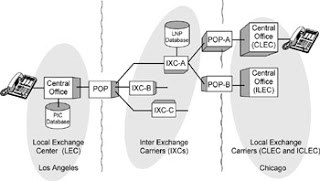Definition of local exchange carrier (LEC) in Network Encyclopedia.
What is LEC (Local Exchange Carrier)?
LEC stands for Local Exchange Carrier, is a telco in the United States that provides local telephone and telecommunication services to businesses and individuals. “Local exchange” refers to a telco’s central office (CO), and “carrier” refers to a company that “carries” telephone and data traffic for customers. In other words, your local exchange carrier (LEC) is simply the company that sends you a telephone bill for local phone calls.
A LEC owns the local loop cabling between its CO and its subscribers’ premises, which are confined to a geographical area known as the local access and transport area (LATA).

Any calls that take place within a given LATA are considered local calls and are billed accordingly.
The largest LECs came into existence with the breakup of AT&T in the early 1980s, which led to the formation of several independent Regional Bell Operating Companies (RBOCs), but there are also a number of smaller independent LECs in the United States, especially in rural areas that were never part of the Bell system. LECs connect their communication networks using inter-exchange carriers (IXCs), which are long-distance carriers such as Sprint, AT&T, and MCI WorldCom.
The Telecommunications Act of 1996 changed the landscape of the telephone system in the United States by allowing LECs to compete in the deregulated long-distance market and by allowing IXCs to provide services directly to customer premises through mergers, acquisitions, and new technologies.
Before 1996, each LEC was also an incumbent local exchange carrier (ILEC) that was the sole provider of telephone services to subscribers in its geographical region. The Telecommunications Act allowed companies to become competitive local exchange carriers (CLECs) that could compete with ILECs in their area by leasing or purchasing services from the ILECs or installing their own systems.
LECs have an advantage in that they already own a right-of-access to customer premises, while IXCs have an advantage in that they are larger, more highly capitalized companies that can afford to invest heavily in new technologies and services or even acquire LECs directly.